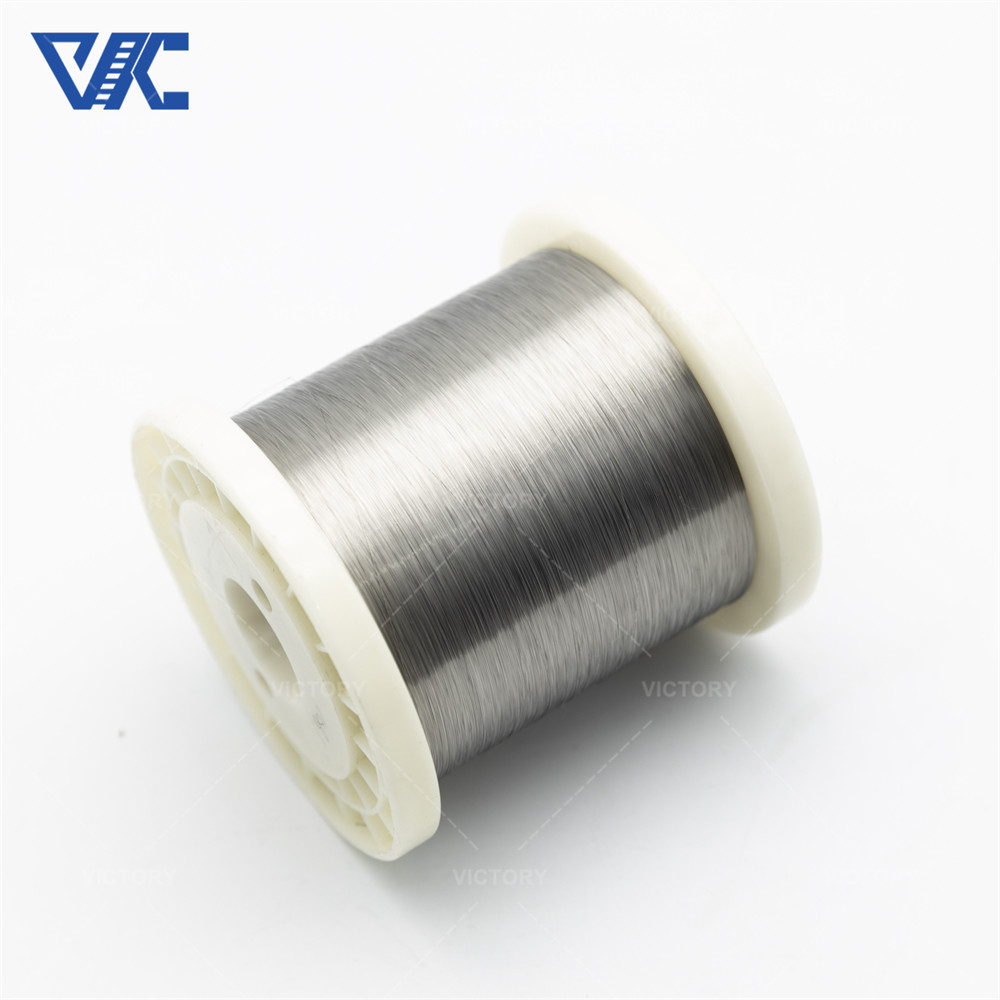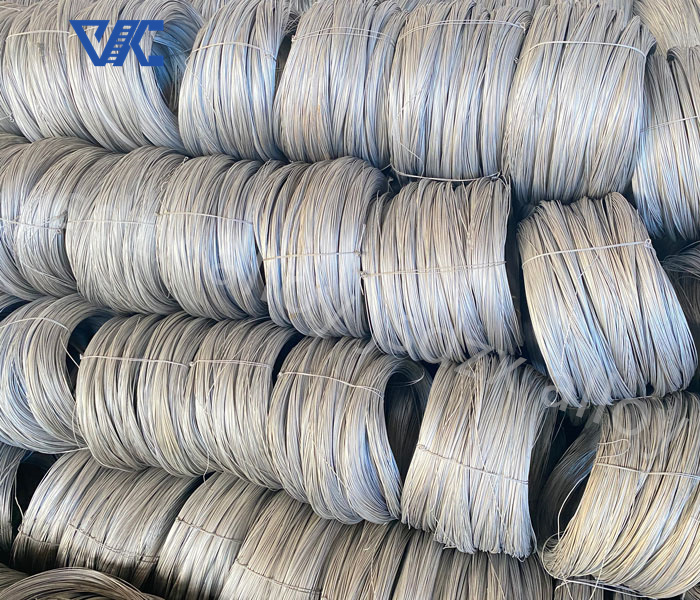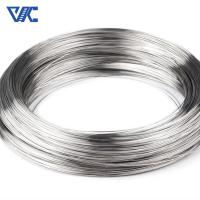Introduction:
Incoloy 800 alloy wire is a high-temperature alloy material that is
widely used in key equipment and processes in the chemical
industry. It is composed of various elements such as nickel, iron
and chromium. It has excellent heat resistance, corrosion
resistance and high strength, and can work stably under high
temperature, corrosive media and high stress conditions.
In the chemical industry, the heat resistance of Incoloy 800 alloy
wire is one of its important features. Chemical production
processes often involve high-temperature reactions, steam treatment
and heating operations, and Incoloy 800 alloy wire can maintain
stability in these high-temperature environments and has good
high-temperature strength and thermal stability to ensure reliable
operation of equipment.
Incoloy 800 alloy wire plays an important role in the chemical
industry and is widely used in key components such as chemical
production equipment, reactors, heat exchangers and pipelines. Its
heat resistance, corrosion resistance and high strength ensure the
efficient operation and long-term stability of chemical industry
equipment and promote the development and progress of the chemical
industry.
Product Parameters:
Main ingredients: nickel (30-35%), iron (39.5% minimum content),
chromium (19-23%), copper (0.75% maximum content), aluminum
(0.15-0.60%), carbon (0.1% maximum content)
Density: 7.94 g/cm3
Melting point: 1350-1400 degrees Celsius
Yield strength: ≥240 MPa
Tensile strength: ≥600 MPa
Thermal expansion coefficient: 13.9 x 10^-6/degrees Celsius (range
20-100 degrees Celsius)
| Incoloy | Ni | Cr | Fe | C | Mn | S | Si | Cu | Al | Ti |
| 800 | 30.0-35.0 | 19.0-23.0 | 39.5min | 0.10max. | 1.50max. | 0.015max. | 1.0max. | 0.75max. | 0.15-0.60 | 0.15-0.60 |
| AMS Number | Alloy | Type | UNS | Cross Ref. Spec | Misc./Shape |
|---|
| AMS 5766 Bar | Incoloy 800 | Nickel | N08800 | - | Bar |
| AMS 5766 Custom Tube | Incoloy 800 | Nickel | N08800 | - | Custom Tube |
| AMS 5871 Plate | Incoloy 800 | Nickel | N08800 | - | Plate |
| AMS 5871 Sheet | Incoloy 800 | Nickel | N08800 | - | Sheet |
| AMS 5871 Strip | Incoloy 800 | Nickel | N08800 | - | Strip |
Characteristic:
Corrosion resistance: Incoloy 800 alloy wire shows excellent
corrosion resistance in the chemical industry and can resist the
erosion of acidic, alkaline and oxidizing media, effectively
extending the service life of equipment.
High temperature stability: This alloy wire has excellent high
temperature stability and oxidation resistance, and can maintain
the stability and strength of its structure in high temperature
environments.
Excellent mechanical properties: Incoloy 800 alloy wire has high
yield strength and tensile strength, and can withstand the pressure
and stress in the chemical industry process.
Advantage:
Corrosion resistance: Incoloy 800 alloy wire has outstanding
corrosion resistance in the chemical industry. It can resist a
variety of corrosive media, such as acids, alkalis, salts, etc.,
and is suitable for various corrosive working conditions.
High-temperature applications: This alloy wire can maintain stable
performance in high-temperature environments and is suitable for
processes that require chemical reactions and treatments under
high-temperature conditions.
Nickel-based alloy: Incoloy 800 alloy wire is a nickel-based alloy
with excellent corrosion resistance and high temperature stability.
It is a commonly used high-performance material in the chemical
industry.
Specific applications:
Chemical reactor: Incoloy 800 alloy wire is often used to
manufacture key equipment such as chemical reactors, catalyst
devices and reaction pipelines. It can withstand high temperature,
high pressure and corrosion from corrosive media.
Oil and gas processing: This alloy wire is suitable for corrosive
environments in oil refining, natural gas processing and chemical
plants, such as cracking furnaces, hydrogenation equipment and
distillation towers.
Acid-base industry: Incoloy 800 alloy wire is often used in the
acid-base industry to manufacture pickling tanks, desulfurizers,
alkali storage tanks and other equipment, and can withstand the
corrosion of acid-base media.
Related knowledge points:
The application of Incoloy 800 alloy wire in the chemical industry
requires the selection of appropriate material specifications and
forms based on specific process flows and media.
In order to ensure the safety and reliability of the equipment,
when using Incoloy 800 alloy wire, it is necessary to follow the
corresponding design and installation specifications, and perform
regular maintenance and inspections.
It should be noted that Incoloy 800 alloy wire may be subject to
certain corrosion in some strongly oxidizing acid media, so the
characteristics of the medium and process conditions need to be
considered when selecting materials.
contact us
email:victory@dlx-alloy.com
Oem service:
Welcome customized size
We are experience factory for OEM&ODM service
Q & A:
Q1: What are some common quality tests conducted on Incoloy 800
wire?
A1: Common quality tests conducted on Incoloy 800 wire include
dimensional inspection, visual inspection, tensile strength
testing, hardness testing, chemical composition analysis, and
corrosion resistance testing.
Q2: How is the dimensional inspection performed on Incoloy 800
wire?
A2: Dimensional inspection of Incoloy 800 wire involves checking
the wire's diameter, length, and overall dimensional accuracy. This
is typically done using specialized measuring tools such as
micrometers or calipers to ensure that the wire meets the specified
dimensional requirements.
Q3: How is the corrosion resistance of Incoloy 800 wire assessed?
A3: The corrosion resistance of Incoloy 800 wire is often evaluated
through various tests, including salt spray testing, exposure to
corrosive environments, and electrochemical testing methods such as
potentiodynamic polarization. These tests assess the wire's ability
to withstand corrosion and maintain its performance under corrosive
conditions.












